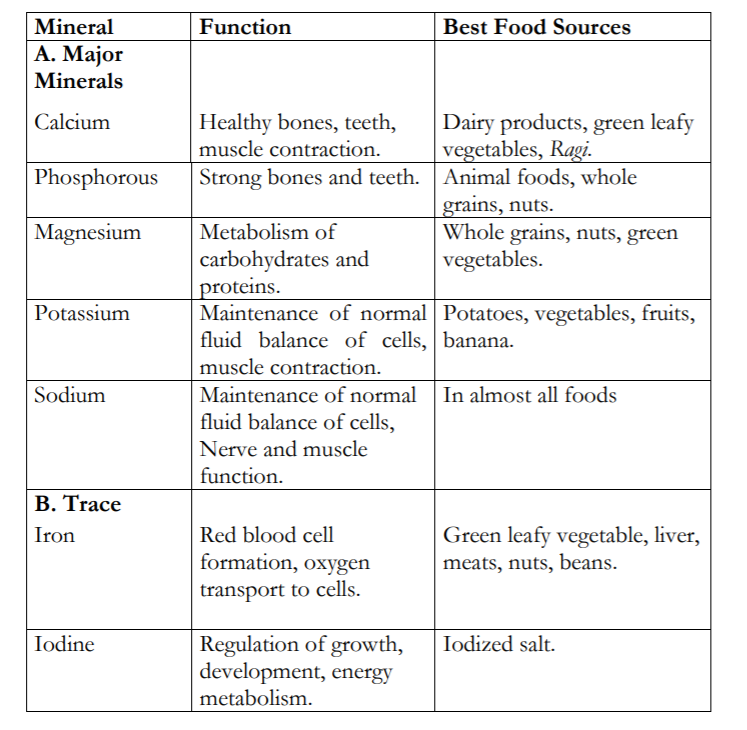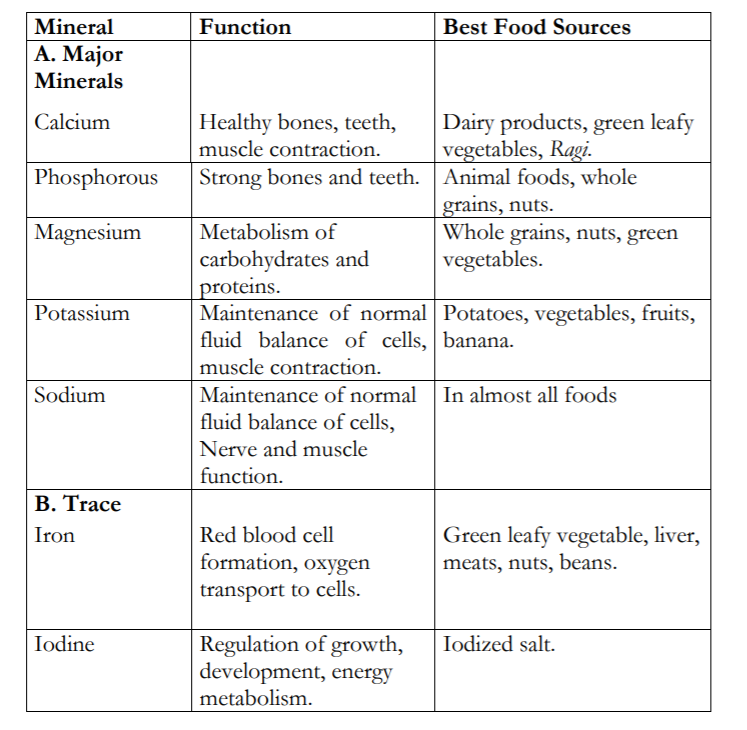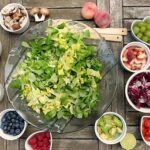Proper nutrition in combination with adequate exercise and emotional
well-being is the key to optimal performance of the human mind and body.
Our body requires six essential nutrients, viz., proteins, carbohydrates,
fats, vitamins, minerals, and water.
These nutrients are found in four basic food groups –
- cereals
- vegetable/fruits
- meat/meat substitutes
- dairy products.
The food items from these groups have to be consumed each day in the way that our maximum food intake comes from cereals followed by vegetables/fruits, meat/meat substitutes, and dairy products.
PROTEINS
Proteins are important for building and repairing all cells and tissues,
including internal organs, muscles, blood cells, brain, bones, and skin.
Proteins are components of enzymes and some hormones which
regulate our body’s activities.
Proteins also provide energy (4k calories/gm) in case of carbohydrate depletion. Carbohydrate depletion takes place during starvation or prolonged exercise session. However, foods rich in proteins are often expensive and we should not waste them as fuel for energy. Proteins are primarily meant for building and maintenance of the body;
carbohydrates and fats are preferred fuels for energy.
More protein does not lead to more muscles. In our body, proteins
exist in a dynamic state. They are continually broken down and replaced by
new proteins. This continued replacement is known as the ‘protein turnover
rate’. Increased physical training, severe illness, hard manual labor, etc.
increase protein turnover rate. Thus, demand for more proteins arises from
within the body. It is not possible to increase the body’s protein
metabolism artificially and thereby stimulate muscle growth simply by
eating more amount of protein. Therefore, you should be careful of the
advertisements of high-protein diets claiming to give you a bodybuilder’s
body without doing any exercises.
CARBOHYDRATES
The main function of carbohydrates is to supply energy. Though
carbohydrates provide an approximately equal amount of energy as proteins
(4Kcalories/gm), they are far more efficient fuel than proteins.
Dietary carbohydrates are of two types – simple and complex. Simple
carbohydrates are made up of one or two sugar molecules (e.g., honey, jelly,
soft drinks, etc.). Complex carbohydrates contain many sugar molecules
linked together. (e.g., whole grains, potatoes, vegetables, and fruits, etc.).
Digestion of carbohydrates starts in the mouth. While chewing food
(mastication) we produce saliva. Salivary enzyme amylase breaks down the
starch(which is tasteless) of carbohydrate to maltose which is sweet. This is
why food tastes sweet if properly chewed.
During digestion, carbohydrates are broken down into glucose and
circulated in the blood to be used for energy. If our body does not use glucose
immediately for energy, surplus glucose is converted into glycogen and
stored in muscles and liver for future use. Approximately, 2/3 glycogen is
stored in muscles and 1/3 in the liver. Since the total glucose storage capacity of muscles and liver is limited, the surplus amount of glycogen is converted
and stored as fat. This is why overeating causes more fat deposits in the body.
Major sources of carbohydrates are rice, wheat, jowar, ragi,
potato, tapioca, banana, honey, fruits.
FATS
Fats are not as bad as most of us are made to believe.
They help in the absorption of fat-soluble vitamin A,
vitamin D, vitamin E, and vitamin K. Vitamin A is required for
growth and repair of tissues, maintenance of proper vision, resistance
to infection; Vitamin D is required for bones and teeth; Vitamin E
helps in the muscle tissue/repair process; Vitamin K is required in the
form of blood clotting, protein formation and also for healthy
bones.
Fats provide energy.
Essential fats (those fats which our body cannot make we
have to get them from food) are required for our normal growth,
healthy arteries, and nerves, for smooth skin and healthy joints. They
also help in cholesterol metabolism. Corn, soybean, safflower oils are
very high in essential fats. Nuts, seeds are also very important sources
of essential fats.
Fats regulate sex hormones.
Fats are necessary for healthy cells.
Cholesterol
Cholesterol is a waxy, light-colored substance. It comes in two
different forms- cholesterol in food and cholesterol in the blood. Our dietary
cholesterol intake should not exceed 300mg/day.
Food cholesterol is 120 mainly found in foods of animal origin (meat, dairy products). Plant foods do not contain any cholesterol. Food nutrition like liver, eggs, beef, pork, chicken, milk is high in cholesterol.
Our liver manufactures blood cholesterol from saturated fats. This
means that the more saturated fat we take the more cholesterol our liver
will make. The excess circulation of cholesterol in the blood can accumulate on
the inner walls of the arteries (called plaque) leading to heart disease.
Cholesterol may be present in blood as a constituent of Low Density
Lipoprotein (LDL) or of High-Density Lipoprotein (HDL). LDL and HDL
affect heart disease risk differently. LDL is known as bad cholesterol. It is
responsible for depositing cholesterol on the artery walls. HDL is good
cholesterol. It contains a smaller amount of cholesterol.
Its job is to remove cholesterol from the cells in the artery walls and transport it back to the liver for reprocessing .
VITAMINS AND MINERALS
Vitamins and minerals are referred to as micronutrients. Unlike
macronutrients (i.e., proteins, carbohydrates, and fats) they do not directly
supply energy.
Vitamins are organic substances. They cannot be synthesized by our
bodies. they are to be obtained from our diet.
Vitamins are classified according to their solubility in fat or water.
There are four fat-soluble vitamins – vitamins A, D, E, and K. They are
absorbed with dietary fats and can be stored to some extent in our body.
Water-soluble vitamins are – vitamin C, B1, B2, B6 , B12, niacin, folic
acid etc. Unlike fat-soluble vitamins, these vitamins are not normally stored
121 in the body. Therefore, we have to take them daily. Symptoms of water-soluble vitamin deficiency may be apparent in 6-7 days.
Minerals
Minerals are inorganic elements constituting approximately 3-4% of
our body weight. These are generally divided into two categories – (i) Trace
elements – these minerals are present in very small quantities, i.e., less than
.01% of body weight; (ii) Macrominerals – they are more than .01% of body
weight. Both are equally important for our body and their deficiency may
have major health implications.

Sodium
Sodium maintains normal water balance within our body, affects
blood pressure, maintains acid-base balance and muscular contraction. The
major sources of sodium are common salt (Sodium Chloride) and MSG
(Monosodium Glutamate). One teaspoon of salt (approx. 5 gm) has
approximately 2000-2200 milligrams of sodium. Sodium is naturally found in the majority of foods. The recommended sodium intake is around 500-2400 mg, a day (i.e. not more than approximately 1¼ teaspoon). Most of us eat more salt and thus take more sodium than we actually need. This will be
evident when we notice the ‘hidden salt’ in our foods – both natural as well
as processed. Junk foods are bad due to their high salt contents also.
Calcium
Calcium and Phosphorous are major constituents of our bones and
teeth. Every day some amount of calcium from the bones circulates in the
blood. This removed amount of bone calcium is quickly replaced by
calcium from our diet. If the dietary calcium is not adequate, the lost bone
calcium cannot be fully replaced. Calcium deficiency may thus lead to
inadequate bone calcification and subsequently to osteoporosis. Dairy
products are major sources of calcium. Those who avoid dairy products in their diet (for fear of weight gain) are at a greater risk.
Iron
Iron deficiency is found to be common among athletes, especially,
those involved in prolonged physical activities (e.g., long-distance running).
This deficiency may be due to inadequate absorption of dietary iron, losses
from the gastrointestinal tract, or excessive sweating.
It is necessary for carrying oxygen to muscles, iron deficiency
may lead to less oxygen supply to muscles. This deficiency may result in
extreme fatigue, loss of strength and endurance, and prolonged recovery
periods after an exercise.
Coffee and tea tend to inhibit the absorption of iron.
Beverages should be taken 1-2 hrs. after the meal.
WATER
By weight, water constitutes approximately 45-60% of the human body.
a small change in water content in our body may cause changes in a biochemical reaction dependent on water. Acute water loss, i.e., dehydration may bring many health complications.
Sufficient water intake is necessary for healthy kidneys. Inadequate
water intake increases the concentration of urine and thus contributes to stones formation as well as the growth of germs infections. The best way to avoid these complications is to keep urine sufficiently dilute by drinking sufficient water throughout the day.


Thanks for reading.


1 Comment